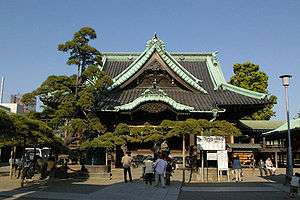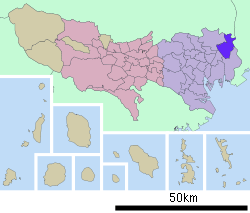Katsushika
Katsushika (葛飾区, Katsushika-ku) is a special ward located in Tokyo, Japan. The ward calls itself Katsushika City in English.
Katsushika 葛飾区 | |
|---|---|
| Katsushika City | |
 Shibamata Taishaku-ten in Katsushika | |
 Flag  Emblem | |
 Location of Katsushika in Tokyo Metropolis | |
 Katsushika Location in Japan | |
| Coordinates: 35°44′N 139°51′E | |
| Country | Japan |
| Region | Kantō |
| Prefecture | Tokyo Metropolis |
| Government | |
| • Mayor | Katsunori Aoki (since December 2009) |
| Area | |
| • Total | 34.80 km2 (13.44 sq mi) |
| Population (May 1, 2015) | |
| • Total | 444,356 |
| • Density | 12,770/km2 (33,100/sq mi) |
| Symbols | |
| • Tree | Willow |
| • Flower | Iris |
| Time zone | UTC+9 (JST) |
| City hall address | 5-13-1 Tateishi, Katsushika-ku, Tokyo 124-8555 |
| Website | www |
As of May 1, 2015, the ward has an estimated population of 444,356, and a population density of 12,770 people per km². The total area is 34.80 km².
Geography
Katsushika Ward is at the east end of Tokyo Metropolis. It is on an alluvial plain and it is low above sea level.
The ward office (Katsushika city hall) is located at Tateishi.
Boundaries
Katsushika has boundaries with three wards of Tokyo: Adachi, Edogawa and Sumida. The cities of Matsudo in Chiba Prefecture, and Misato and Yashio in Saitama Prefecture form the northeast border of the ward.
Rivers
Major rivers in Katsushika include the Edogawa, Arakawa and Ayasegawa. Nakagawa and Shin-nakagawa flows through the ward.
Districts and neighborhoods
|
|
History
Katsushika District was originally a division of Musashi Province. When the province was divided and reconfigured, the district was partitioned between Kita-Katsushika District (within Saitama Prefecture), Higashi-Katsushika District (within Chiba Prefecture) and the remainder was based in Tokyo Prefecture. Minami-Katsushika District conformed today's Katsushika Ward proper, plus Edogawa, Koto and Sumida wards.
On October 1, 1932, the former Minami-Katsushika District of what was then known as Tokyo Prefecture, and its seven towns and villages, merged and became part of the old Tokyo City.
The special ward was founded on March 15, 1947.
Katsushika contains the Kasai Shrine, Narihira Santosen Temple, the "Bound Jizō" of Ōoka Echizen, and Shibamata Taishakuten, selected as one of the 100 Soundscapes of Japan and 100 Landscapes of Japan (Heisei era).
Economy
Takara Tomy has its headquarters in Katsushika.[1]
Government and infrastructure
The Tokyo Detention House, a correctional facility, is in the ward.[2] One of Japan's seven execution chambers is in the Tokyo Detention House.[3]
Education
Colleges and universities
High schools
Tokyo Metropolitan Government Board of Education operates public high schools.
Elementary and junior high schools
Katsushika operates public elementary and junior high schools.
- Katsushika Aoto Junior High School
- Katsushika Okudo Junior High School
Transportation
Rail
- JR East
- Joban Line: Kameari, Kanamachi Stations
- Sobu Main Line: Shin-Koiwa Station
- Keisei Electric Railway
- Keisei Main Line: Horikiri-shobuen, Ohanajaya, Aoto, Keisei Takasago Stations
- Keisei Oshiage Line: Yotsugi, Keisei Tateishi, Aoto Stations
- Keisei Kanamachi Line: Keisei Takasago, Shibamata, Keisei Kanamachi Stations
- Hokuso Railway Hokuso Line: Keisei Takasago, Shin-Shibamata Stations
Highways
- Shuto Expressway C2 Central Loop (Itabashi JCT - Kasai JCT)
- Route 6 (Mito Kaidō)
- Kan-nana
- Kuramae bashi
- Heiwa bashi
- Shibamata Kaidō
- Okudo Kaidō
- Tokyo Route 307 Oji-Kanamachi-Edogawa line (Oji-ekimae to Minami-shinozaki)
Sister cities
Katsushika has sister-city relationships with Fengtai District in Beijing, China, and with Floridsdorf, a district of Vienna, Austria.
Notable people
- Rumi Hiiragi, actress, voice actress (Spirited Away, Ponyo on the Cliff by the Sea)
- Susumu Hirasawa, progressive-electronic musician
- Minako Honda, singer, musical actress
- Yui Horie, singer, voice actress
- Takaaki Ishibashi, owarai comedian, actor, singer
- Satomi Kobayashi, actress
- Kazunari Ninomiya, singer, actor, voice actor, presenter[11]
- Kenny Omega, Professional Wrestler
- Miho Takagi, actress, essayist
- Youichi Takahashi, manga artist, creator of Captain Tsubasa
Notable works set in Katsushika
The longest-running manga series in history, Kochira Katsushika-ku Kameari Kōen-mae Hashutsujo takes place in Katsushika. The neighborhood of Shibamata is the home of Tora-san, the protagonist of the long-running Otoko wa Tsurai yo film series, played by Kiyoshi Atsumi. A statue of Tora-san stands outside of Shibamata Station.[12] Other notable works set in Katsushika are the television series Kamen Rider Hibiki and the film Long Vacation. A statue of Captain Tsubasa main character, Ozora Tsubasa, is also located there, as the fictional town of Nankatsu was inspired by Katsushika itself.
See also
References
- "Corporate Information Archived 2010-03-30 at the Wayback Machine." Takara Tomy. Retrieved on March 16, 2010.
- "Diet members tour execution chamber." The Japan Times. Thursday July 24, 2003. Retrieved on August 27, 2010.
- Lendon, Brad. "Japan reveals long-secretive execution process." CNN. August 27, 2010. Retrieved on August 27, 2010.
- 東京都立葛飾商業高等学校. www.katsushikashogyo-h.metro.tokyo.jp. Retrieved 10 April 2018.
- http://www.katsushikasogo-h.metro.tokyo.jp/
- http://www.katsushikano-h.metro.tokyo.jp/
- http://www.honjokogyo-h.metro.tokyo.jp/
- 東京都立南葛飾高等学校. www.minamikatsushika-h.metro.tokyo.jp. Retrieved 10 April 2018.
- http://www.nousan-h.metro.tokyo.jp/
- 東京都立葛飾盲学校. www.katsushika-sb.metro.tokyo.jp. Retrieved 10 April 2018.
- 二宮和也 [Kazunari Ninomiya] (in Japanese). Tower Records Japan. Retrieved February 22, 2018.
- "Follow in the footsteps of Japans beloved Tora-san". BBC Travel. Retrieved 19 October 2018.
External links
![]()
- Katsushika City Official Website (in Japanese)
